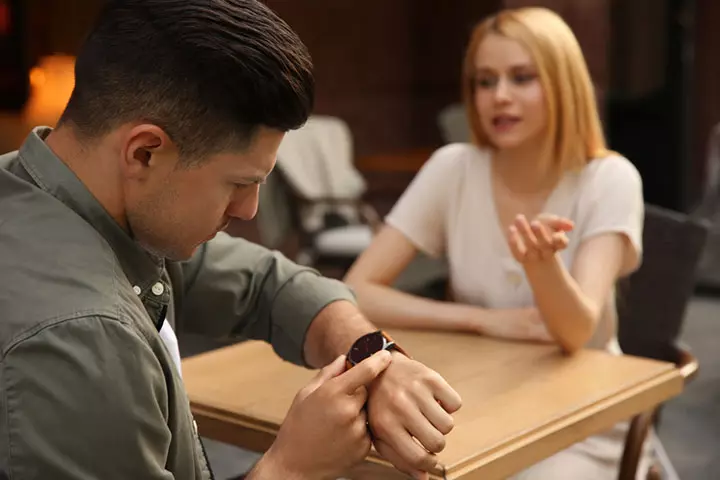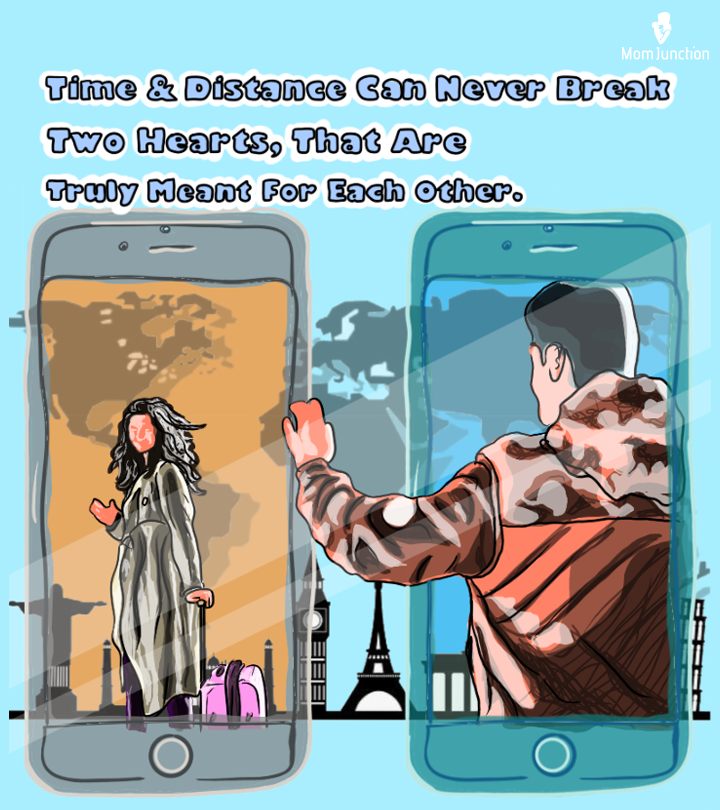
Image: Midjourney/ MomJunction Design Team
No matter how good you are or how well you treat others, there will still be people who don’t like you. While people may not directly express their feelings, some signs indicate when someone harbors feelings of dislike towards you. In this post, we apprise you on how to tell if someone doesn’t like you. These signs are subtle and can vary based on individual personality traits, hence, you must know how to interpret negative body language and communication patterns. Recognizing them can help you identify those who pretend to like you but, deep down, have a grudge against you. This way, you can cut off negative people from your life and avoid rejections and heartbreaks. Keep scrolling to learn more.

Key Pointers
- You may be friendly and accommodating, yet there can be people who may not like you.
- Avoiding looking into your eyes, having a forced smile, and continuously moving away while talking to you suggests that they dislike you.
- Look for more signs and signals to ascertain the person’s true feelings before moving away from them.
15 Signs On How To Tell If Someone Doesn’t Like You
When you can tell that someone doesn’t like you and they don’t say it to your face but show it through their actions, you feel hurt and dejected. The pain of rejection and social exclusion is not too different from physical pain and can negatively influence your emotions, cognition, and even your physical health (1). So, if you spot more than a few of the following signs from someone you like, it is best to remove yourself before you are hurt even more. Here are some signs you should look out for:
1. They have a closed body language

People who don’t like you may express this through their body language. You can often see such differences between introverts and extroverts too. People who like you lean toward you and engage in conversation while those who don’t may avoid eye contact, lean away from you, and cross their arms or legs or both. Psychotherapist Lucille Loveday Milne observes, “Shy people are often nervous about expressing their feelings, but you can also look for subtle signs – body language, how they talk around you, being emotionally more open, even getting nervous around you can be a sign they are interested.”
Relationship counselor Julie Tenner opines, “A disinterested person is inconsistent or passive in communication. Shyness affects how someone interacts, not whether they interact. A distant person makes you feel like you’re always chasing them. If you’re the one constantly initiating, planning, or keeping the connection alive, it’s a sign of disinterest, not shyness.”
However, body language is not always the best way to tell if someone likes or dislikes you. The belief that certain nonverbal behaviors have universal meanings is a misconception, as body language is often ambiguous and context-dependent (2). For instance, in more conservative societies, it is normal for people, especially women, to have closed body language. It is not a sign of rudeness or rejection. According to clinical psychologist Dr. Easton Gaines, “The key to understanding lies in mindful observation—attending to not only what someone says, but how and when they choose to engage. By honoring the quiet nature of introverts and sensitively differentiating it from genuine disinterest, we can foster deeper, more authentic connections.”
2. They give a fake smile
If a person’s smile doesn’t seem genuine to you, it might mean they do not like you. In a happy relationship, when people are relaxed with each other, there is no need to force a smile. However, if a person doesn’t like to be in your presence, they may force a smile when you interact.
For example, you may be at a party with your coworkers and smile at someone, only for them to smile back at you in a restrained way. While it may indicate dislike, it can also mean they are not good at understanding social cues or do not want to converse with you.
 Point to consider
Point to consider3. They scratch their neck
Scratching the neck is a common sign that someone doesn’t like you. However, it can easily be misunderstood as flirting. When you know for certain that the person is not flirting with you, this can be a sign of dislike. Sometimes, the person may raise their shoulders and try to hide their neck. It means that they are hiding something from you or they disagree with you but are not willing to discuss it further.
Remember that scratching one’s neck does not indicate rejection; if the behavior is in conjunction with other signs, such as avoiding eye contact and giving non-answers, you may interpret it as dislike.
4. They try to create some distance from you

If a person continuously moves away from you while you interact with them, they might not like you. For instance, if you move closer to a classmate during a group discussion, they immediately step back or subtly move their chair away. Walking away is perfectly normal if they are busy, but you need to observe if they do this regularly even when they aren’t busy. Many times, a person who doesn’t like you might shun or ignore you consciously or subconsciously. It simply means they have no interest in interacting with you and prefer to stay away from you. Licensed social worker and therapist Angela Ficken says, “Someone emotionally unavailable or simply not interested will typically show consistent disengagement regardless of how comfortable or low-pressure the environment is. They may give short answers, avoid follow-up questions, not make eye contact, or seem indifferent to your presence.”
5. Their conversations are surface level
If someone talks superficially with you, it can mean they have no feelings for you. When someone cares, they will want to know genuinely how you are doing. They will ask questions that convey they are interested in you. This may make you feel comfortable enough to share intimate details about yourself because you know they care and are trustworthy. A person who doesn’t like you will not ask deep questions. They will be careful not to get in too emotionally deep.
However, if a person only engages in small talk with you, it doesn’t automatically mean they dislike you. Context always matters. For instance, you would not have a deep, heart-to-heart conversation with a colleague or a client. Neither would you share intimate details about your life with a friend’s spouse. It does not mean you dislike them.
Counselor and mental health professional Jessica Condell notes, “Someone genuinely interested will communicate clearly and consider your feelings. Compare these two messages: 1. Can’t make it tonight, have a good one.’ 2. ‘I’m so sorry to cancel at the last minute. I was really looking forward to meeting you. Are you free another night this week?’ The first leaves you uncertain; the second reassures you of their interest. Ultimately, attraction is demonstrated through consistency, respect, and effort.”
6. They purse their lips
If a person purses their lips when you are talking to them, it might mean they are uncomfortable in your presence. Sometimes, it could also mean that they disagree with the topic of discussion. For instance, if you share an idea during a meeting at work, a coworker purses their lips as though suppressing their disapproval or opinion. If you feel they disagree with the topic, change the subject and see if they pursue their lips again. If they also deny or disapprove of the new topic, it probably means they don’t like you.
 Point to consider
Point to consider7. They do not maintain eye contact
It is a basic etiquette to maintain eye contact when you are talking with someone. If a person is deliberately looking away from you while you are speaking, it could mean they don’t like you. They do not feel connected to you and so, they do not feel the need to maintain eye contact. They might be more interested in other things around them than what you are saying.
However, being unable to maintain eye contact can also be an indicator of other things. The person may belong to the autism spectrum and have difficulty maintaining eye contact (3). They may belong to a culture that considers prolonged eye contact rude or disrespectful (4).
8. They maintain too much eye contact

While not maintaining eye contact is a way to tell if someone doesn’t like you, the opposite is also true. A person who looks you continuously in the eyes doesn’t want to be in your company but feels guilty about their feelings. To overcompensate for their dislike, they stare at you while talking. They do this unconsciously but you can take it as a sign of dislike.
While this sign may seem contradictory, it proves body language is unreliable as an indicator of liking or dislike. Considering body language as an actual language is misleading, as it does not come with set rules of syntax and grammar as a real language. Nonverbal communication does not have a structured system with set meanings, which makes its interpretation subjective (2). So, before jumping to any conclusion on whether or not a person likes you based on eye contact, look out for more explicit patterns of behavior.
9. They don’t mirror your actions
When a person likes you, they unconsciously tend to mirror your actions, body language, or even your voice. It is one of the ways of socializing and making others believe that they are similar to you. However, when a person dislikes you, they do not mimic your actions. For instance, if you lean forward while walking to the person, they do not copy your movement and maintain their posture. Depending on the context, it may indicate that they do not see the need to be a part of your circle.
10. They do not touch you
When a person likes you, even if you are just platonic friends, they tend to reach out and touch you. Touching is an intimate gesture that shows trust and also that they are interested in you. However, if someone isolates themselves from you or doesn’t like you, they will make no effort to touch you. Even if you are in a romantic relationship, and they have generally been open to touch with you in the past, they may touch you as little as they can.
However, there can be myriad reasons why a person does not touch or like to be touched. Touch aversion is a common aftermath of trauma or PTSD (5). Those belonging to the autism spectrum also often dislike being touched (6). It may also be a rare case of haphephobia, an overwhelming and irrational fear of being touched (7). Or, it may simply be that the person comes from a conservative background and does not feel close enough to touch you comfortably. Neither of these cases indicates dislike or rejection.
11. They have forced conversations
There are times in everyone’s lives when they are too busy to answer your questions. However, if they persistently show an aversion to conversation and give monosyllabic answers to your page-long questions, it means they are not comfortable in your company or they do not like the topic of discussion. For instance, if you ask them how their day is going, they’ll say “Fine” or “Good” and neither elaborate further nor ask any questions. It means they do not see any reason to be affected by your talk and might withdraw into a shell, giving cold answers, thus trying to alienate themselves from you.
12. They keep checking the time

If a person loathes you, they do not wish to spend more time than they can in your presence. They look for escape routes and check the time often. It is said that time flies in the company of friends. The opposite is also true. When you are with a person you dislike, time doesn’t seem to move at all. This might cause impatience and hence the constant time checks.
However, it is also important to remember the context. The person may be running late for an appointment or errand, or they may be looking forward to a call or mail at a certain time. Checking the time does not automatically mean that they dislike you.
13. They talk only about themselves
While some people give out signs when they detest you, some people are too self-absorbed to do so and may overlook your presence altogether. They are not interested in you or your life. All they want is a person who will listen to them. If a person genuinely likes you, they will ask questions and try to elicit answers from you. Licensed clinical social worker Dr. Michelle Beaupre observes, “Someone who’s not interested tends to rarely ask about your feelings or experiences, change the subject when you share something personal, take a long time to respond to messages without explanation, and make little effort to include you in their life.”
People who dislike you will marginalize your input and may disdain your thoughts and opinions. For instance, if you are on a date and the person constantly speaks about their work and personal life without asking you any questions and barely acknowledging your input, they do not care about you.
14. They are too busy to meet you

It is understandable when someone cancels a meeting at the last minute. However, if a person continuously turns down plans to meet you, you might want to reconsider the relationship. While turning down meetups is not an immediate indicator of dislike, it is not a good sign if a person always turns you down but shows up for other mutual friends.
Everyone is busy with their studies, work, children, and errands. But if a person cares about you, they will surely keep some time aside to spend with you. However, making excuses or showing they are too busy might be one of the signs that he doesn’t care about the relationship.
15. Their feet are pointed away from you
The next time you are meeting someone you aren’t sure is interested in you, take a glance at their feet. A person who likes you will have their feet turned towards you, and a person who doesn’t will have their feet turned away from you. However, this is a subtle sign and may not always indicate disinterest. Keep the context in mind and try not to read too much into such a sign unless paired with more apparent signs of dislike, such as disengaged behavior and lack of eye contact.
What To Do If Someone Doesn’t Like You
Social and interpersonal rejection can be deeply painful, often leading to feelings like anger, anxiety, jealousy, shame, loneliness, depression, and sadness (8). When you sense that someone doesn’t like you, it’s important to have coping strategies in place to protect your mental health. Here are some practical tips to help you handle such situations:
- Accept that not everyone will like you: You must make your peace with the idea that not everyone will be fond of you. Focus on those who already like you, and don’t base your self-worth on others’ opinions.
- Be positive and kind: Even if someone treats you with disdain, be respectful and kind. It does not mean becoming a doormat. Being firm yet friendly reflects your character and may even alter their perception of you over time.
- Think about possible reasons: Consider if there may be a specific reason why the person does not like you. If possible, talk with them to clear out any misunderstandings or conflicts. According to licensed professional counselor Dr. Brooke Keels, “Direct communication remains the most effective way to clarify uncertainty. A few simple questions like ‘Are you comfortable being here?’ or ‘Do you find this topic interesting?’ can further help you assess if the person is just having a hard time getting over their own introverted tendencies or they just simply can’t be bothered to engage with you.”
- Set boundaries and limit interaction: If the person’s behavior is harming your mental health, set boundaries and limit your contact with them to protect your peace of mind.
- Seek support and focus on yourself: Use this experience as constructive feedback and an opportunity for personal growth. Reach out to friends and family or a professional for advice and perspective on best tackling the situation.
- Stay true to yourself: Whatever you do in terms of reflecting or self-improvement, do not change who you are as a person to gain someone’s approval. Being authentic is key to building genuine relationships, and those who like you as you are will stay in your life without forcing you to change.
Frequently Asked Questions
1. What should I do when someone doesn’t like me for no reason?
If someone doesn’t like you for no apparent reason, don’t make assumptions and don’t let them affect you; instead, practice self-awareness, focus on personal growth, don’t wait for approval from others, and surround yourself with people who care about you.
2. Why are people friendly with the person they don’t like?
People can be friends with someone they dislike for various reasons, like they have been in a relationship with them and got bored of them, the person benefits from the other, or they empathize with the other.
3. How should I act with someone I dislike?
It can be challenging to deal with someone who dislikes you, but it’s crucial to respond maturely and respectfully. To prevent the situation from worsening, you should try to remain calm and composed. Empathy is beneficial; if possible, you can diffuse the misunderstanding. Clinical psychologist Dr. Nivedita Nayak suggests, “Silence can be mistaken for coldness, but it may just be someone processing internally or protecting their energy. A good way to distinguish is by gently starting the conversation more than once. If they gradually open up, it’s likely introversion or shyness. If they remain indifferent, it may be emotional disengagement.” However, it is wise to maintain self-respect and focus on positive relationships with others who value you.
4. How should I react if my dislike for someone is affecting my work?
If someone’s dislike of you impacts you, it shows that you invested in them and had reasonable expectations of them. However, you must avoid waiting or following them when there is no prospect of you getting together. Instead, focus on yourself by engaging in hobbies or activities that help reduce stress and consider new opportunities to improve your personality and well-being.
5. What is one word for ‘I don’t like you?’
Some one-word terms, which mean ‘I don’t like you,’ include dislike, detest, hate, enmity, and resentment.
It can be taxing and disappointing when you realize that someone doesn’t like you, especially if they are someone you care about. Many people refuse to accept reality when the dislike is from a crush, romantic partner, or a close friend. Knowing how to tell if someone doesn’t like you can help you distance yourself from that person and avoid unpleasant feelings and conflicts. This could also help you make your next step accordingly and avoid an awkward situation in the future.
Infographic: Signs Someone Doesn’t Like You
All your efforts to win their heart or form a good friendship may go in vain if they don’t like you in the first place. So instead of shooting a blank, learn to read the signs to see if they like you or not and take a different approach to make things work. Here are a few most obvious ones that indicate a person dislikes you.
Some thing wrong with infographic shortcode. please verify shortcode syntax
It is always challenging to find out what opinions people have of you. Here are ten significant signs to know if people don’t like you.
References
- The pain of social rejection.
https://www.apa.org/monitor/2012/04/rejection - Miles L. Patterson et al.; (2025); Four Misconceptions About Nonverbal Communication.
https://journals.sagepub.com/doi/10.1177/17456916221148142 - Autism Spectrum Disorder.
https://www.nimh.nih.gov/health/publications/autism-spectrum-disorder - “Eye Contact” Culturally Responsive Health and Physical Education.
https://dm.education.wisc.edu/djtimm/intellcont/Winter%202015%20Newsletter_Eye%20Contact-1.pdf - Timmy Strauss et al.; (2019); Touch aversion in patients with interpersonal traumatization.
https://pubmed.ncbi.nlm.nih.gov/31209965/ - ‘I will feel actual rage.’ Unusual responses to kind touches could help explain autism traits.
https://www.science.org/content/article/i-will-feel-actual-rage-unusual-responses-kind-touches-could-help-explain-autism-traits - Haphephobia (Fear of Being Touched).
https://my.clevelandclinic.org/health/diseases/21964-haphephobia-fear-of-being-touched - Mark R. Leary; (2015); Emotional responses to interpersonal rejection.
https://pmc.ncbi.nlm.nih.gov/articles/PMC4734881/#sec7
Community Experiences
Join the conversation and become a part of our nurturing community! Share your stories, experiences, and insights to connect with fellow parents.
Read full bio of Jason Polk

Michelle Beaupre a clinical director at Villa Oasis a residential treatment center located in San Diego. Michelle has over 15 years of experience working with individuals couples and families as a licensed clinical social worker. Most of her clients experience issues including co-occurring disorders. Clients need support understanding why they make certain choices and the impact of those choices. Her goal is to help her clients identify and practice positive coping skills to manage their mental health and substance use.
Michelle Beaupre a clinical director at Villa Oasis a residential treatment center located in San Diego. Michelle has over 15 years of experience working with individuals couples and families as a licensed clinical social worker. Most of her clients experience issues including co-occurring disorders. Clients need support understanding why they make certain choices and the impact of those choices. Her goal is to help her clients identify and practice positive coping skills to manage their mental health and substance use.

Dr. Easton Gaines is a New York State clinical psychologist and founder of MindCare Psychology. She integrates mindfulness, neuroscience, and holistic wellness to help clients of all ages achieve optimal well-being. Easton is a holistic psychologist who is passionate about making science, wellness, and psychology accessible to everyone. As a trained psychologist, she provides integrative, strengths-based psychotherapy that is grounded in scientifically-backed, evidence-based methods.
Dr. Easton Gaines is a New York State clinical psychologist and founder of MindCare Psychology. She integrates mindfulness, neuroscience, and holistic wellness to help clients of all ages achieve optimal well-being. Easton is a holistic psychologist who is passionate about making science, wellness, and psychology accessible to everyone. As a trained psychologist, she provides integrative, strengths-based psychotherapy that is grounded in scientifically-backed, evidence-based methods.

Jessica Condell has spent 15 years helping people make sense of their relationships, mental health, and life experiences. With a background in social work and counselling, she has worked in a variety of settings, supporting individuals through challenges and helping them build healthier ways of relating to themselves and others.
Her experience spans relationship dynamics, trauma recovery, mental health, and parenting support. She has worked with individuals impacted by adverse childhood experiences, including parental separation, domestic abuse, neglect, and substance use.
Jessica now runs a private practice in Cronulla, where she works with individuals experiencing relationship challenges, parenting concerns, workplace difficulties, and trauma recovery. She also partners with local services supporting individuals rebuilding their lives after domestic abuse.Jessica Condell has spent 15 years helping people make sense of their relationships, mental health, and life experiences. With a background in social work and counselling, she has worked in a variety of settings, supporting individuals through challenges and helping them build healthier ways of relating to themselves and others.
Her experience spans relationship dynamics, trauma recovery, mental health, and parenting support. She has worked with individuals impacted by adverse childhood experiences, including parental separation, domestic abuse, neglect, and substance use.
Jessica now runs a private practice in Cronulla, where she works with individuals experiencing relationship challenges, parenting concerns, workplace difficulties, and trauma recovery. She also partners with local services supporting individuals rebuilding their lives after domestic abuse.
Lucille Loveday is a feminist psychotherapist and relationship counsellor. She is the founder & CEO of Venus Moves Therapy & Education for Women. With a background in gender-inclusive education, feminist therapy, and trauma-informed care, Lucille specializes in helping women and couples navigate the complexities of modern relationships with honesty, empathy, and empowerment. She is a survivor advocate for Full Stop Australia, centering the voices of survivors in the advocacy space.
Lucille Loveday is a feminist psychotherapist and relationship counsellor. She is the founder & CEO of Venus Moves Therapy & Education for Women. With a background in gender-inclusive education, feminist therapy, and trauma-informed care, Lucille specializes in helping women and couples navigate the complexities of modern relationships with honesty, empathy, and empowerment. She is a survivor advocate for Full Stop Australia, centering the voices of survivors in the advocacy space.

Dr. Brooke Keels has a master of science in Counseling Psychology from Louisiana State University and a PhD in Marriage and Family Therapy from the University of Louisiana Monroe. Dr. Keels works to create, implement, and oversee partial hospitalization (PHP), intensive outpatient (IOP), and individual and family therapy programs at Lighthouse. She has worked in the recovery industry in a professional capacity for over 15 years in a variety of roles. She brings an empathetic and caring approach to all those she works with.
Dr. Brooke Keels has a master of science in Counseling Psychology from Louisiana State University and a PhD in Marriage and Family Therapy from the University of Louisiana Monroe. Dr. Keels works to create, implement, and oversee partial hospitalization (PHP), intensive outpatient (IOP), and individual and family therapy programs at Lighthouse. She has worked in the recovery industry in a professional capacity for over 15 years in a variety of roles. She brings an empathetic and caring approach to all those she works with.

Dr. Nivedita Nayak is a clinical psychologist with a PhD in Psychology from the Tata Institute of Social Sciences in Mumbai. She has worked extensively in trauma, emotional intelligence, and family systems. Dr. Nayak helps individuals and families understand and manage the emotional undercurrents that shape their relationships. Her work is known for being grounded, compassionate, and deeply human.
Dr. Nivedita Nayak is a clinical psychologist with a PhD in Psychology from the Tata Institute of Social Sciences in Mumbai. She has worked extensively in trauma, emotional intelligence, and family systems. Dr. Nayak helps individuals and families understand and manage the emotional undercurrents that shape their relationships. Her work is known for being grounded, compassionate, and deeply human.

Julie Tenner is an intimacy & relationship therapist, counsellor, author, speaker, and co-host of the Nourishing the Mother podcast. With over 20 years of expertise in couples therapy, trauma healing, and somatic intimacy work, she helps long-term couples and women escape cycles of stagnation and rediscover the magnetic pull of connection, passion, and desire. A mother of four and specialist in sex, polarity, and trauma-informed healing, Julie understands the complexities of balancing love, family, and self. Through her coaching, speaking, and wildly popular podcast with over a million downloads, she is a trusted voice in modern relationships
Julie Tenner is an intimacy & relationship therapist, counsellor, author, speaker, and co-host of the Nourishing the Mother podcast. With over 20 years of expertise in couples therapy, trauma healing, and somatic intimacy work, she helps long-term couples and women escape cycles of stagnation and rediscover the magnetic pull of connection, passion, and desire. A mother of four and specialist in sex, polarity, and trauma-informed healing, Julie understands the complexities of balancing love, family, and self. Through her coaching, speaking, and wildly popular podcast with over a million downloads, she is a trusted voice in modern relationships
- Angela Ficken is a clinical social worker and the owner of Progress Wellness, Boston. She did her masters in Social Work from Boston College and has over 19 years of experience in the field of therapy. Angela challenges her clients to work on becoming their happier and healthier self.
 Angela Ficken is a clinical social worker and the owner of Progress Wellness, Boston. She did her masters in Social Work from Boston College and has over 19 years of experience in the field of therapy. Angela challenges her clients to work on becoming their happier and healthier self.
Angela Ficken is a clinical social worker and the owner of Progress Wellness, Boston. She did her masters in Social Work from Boston College and has over 19 years of experience in the field of therapy. Angela challenges her clients to work on becoming their happier and healthier self.
Read full bio of Shikha Thakur
Read full bio of Siddharth Kesiraju
Read full bio of Benidamika J Latam

















